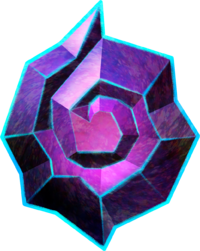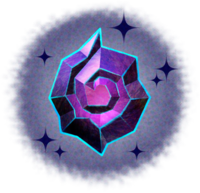Dark Stone: Difference between revisions
(Undo revision 4297236 by 50.125.60.35 (talk) Never stated that it does) Tags: Undo Mobile edit Advanced mobile edit |
A username (talk | contribs) (→Names in other languages: portuguese name from dream team) Tag: Mobile edit |
||
| Line 27: | Line 27: | ||
|Ger=Finsterstein | |Ger=Finsterstein | ||
|GerM=Dark Stone | |GerM=Dark Stone | ||
|Por=pedra das trevas | |||
|PorM=darkness stone | |||
}} | }} | ||
Revision as of 14:56, July 25, 2024
| Dark Stone | |
|---|---|

| |
| First appearance | Mario & Luigi: Dream Team (2013) |
The Dark Stone is an ancient Pi'illo artifact that appears in Mario & Luigi: Dream Team. The Dark Stone is a dark purple stone in the shape of a spiral with jagged edges. Unlike the Dream Stone, which was made from the happy dreams of the inhabitants, the Dark Stone is fueled by the nightmares of people.
History
Since the Dark Stone was destroyed before the events of the game, it is never shown to the player, but it is mentioned by Prince Dreambert after Mario and Luigi save the second Pi'illo in Pi'illo Castle. Dreambert states that there were two stones: one called the Dream Stone and the other called the Dark Stone. Both of these stones had the power to grant anyone's wishes as long as they possessed it. The stones were hidden because of their great power, but Antasma managed to steal the Dark Stone. Before he was sealed into the Dream World by the Pi'illos, Antasma crushed the Dark Stone into many pieces. These pieces became Nightmare Chunks and petrified the Pi'illo people in the Dream World by trapping their soul in these chunks.
Names in other languages
| Language | Name | Meaning | Notes |
|---|---|---|---|
| Japanese | ダークストーン Dakusutōn[?] |
Dark Stone | |
| Dutch | Duistersteen[?] | Darkness Stone | |
| French (NOE) | Pierre des ténèbres[?] | Darkness Stone | |
| German | Finsterstein[?] | Dark Stone | |
| Italian | Pietra Oscura[?] | Dark Stone | |
| Portuguese | pedra das trevas[?] | darkness stone | |
| Russian | Мракулит[?] Mrakulit |
From Мрак (Dark) and -лит (common suffix for rocks) | |
| Spanish (NOE) | Piedra oscura[?] | Dark stone |
